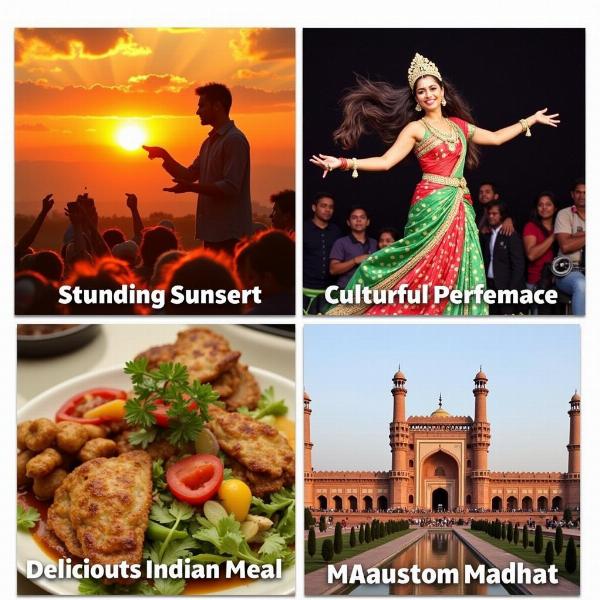Understanding the phrase “i have ever seen in my life” and its Hindi equivalent is crucial for accurately conveying the superlative nature of the experience being described. This article dives deep into various Hindi translations, exploring their nuances and cultural context, providing you with the perfect phrasing to capture the essence of this powerful expression.
Expressing “I Have Ever Seen In My Life” in Hindi
Several Hindi phrases effectively translate “i have ever seen in my life,” each with subtle differences in emphasis and usage. Here are some of the most common and accurate translations:
-
ज़िंदगी में मैंने आज तक ऐसा नहीं देखा (Zindagi mein maine aaj tak aisa nahin dekha): This is a straightforward translation, meaning “In my life, I have not seen such a thing until today.” It emphasizes the uniqueness of the experience.
-
अपने जीवन में मैंने कभी ऐसा नहीं देखा (Apne jeevan mein maine kabhi aisa nahin dekha): This phrase, meaning “In my life, I have never seen such a thing,” highlights the unprecedented nature of what’s being described.
-
आज तक मैंने ऐसा कुछ नहीं देखा (Aaj tak maine aisa kuchh nahin dekha): A slightly shorter version, meaning “Until today, I have not seen anything like this,” focuses on the present moment as the culmination of never having witnessed something similar.
-
मैंने अपने जीवन में इससे बेहतर कुछ नहीं देखा (Maine apne jeevan mein isse behtar kuchh nahin dekha): This translation, meaning “I have not seen anything better than this in my life,” expresses the superior quality of the experience. It is particularly useful when describing something exceptionally good.
Choosing the Right Hindi Phrase
Selecting the most appropriate Hindi translation depends on the context and the specific nuance you wish to convey. Consider the following factors:
-
Formality: For formal situations, using “अपने जीवन में मैंने कभी ऐसा नहीं देखा (Apne jeevan mein maine kabhi aisa nahin dekha)” is generally preferred.
-
Emphasis: If you want to stress the uniqueness of the experience, “ज़िंदगी में मैंने आज तक ऐसा नहीं देखा (Zindagi mein maine aaj tak aisa nahin dekha)” might be more suitable.
-
Comparison: When comparing something to other experiences, “मैंने अपने जीवन में इससे बेहतर कुछ नहीं देखा (Maine apne jeevan mein isse behtar kuchh nahin dekha)” is the most effective choice.
Common Usage Examples
Let’s explore some practical examples to further illustrate the usage of these phrases:
-
Describing a natural wonder: “The Himalayas are the most magnificent mountains maine apne jeevan mein kabhi aisa nahin dekha.”
-
Expressing admiration for a performance: “That dancer’s performance was mesmerizing; aaj tak maine aisa kuchh nahin dekha.”
-
Commenting on a delicious meal: “This is the best biryani zindagi mein maine aaj tak aisa nahin dekha!”
 Hindi phrases for expressing the best experience
Hindi phrases for expressing the best experience
Importance of Cultural Context
While the literal translations are accurate, understanding the cultural context enhances communication. Indians often use hyperbolic expressions to emphasize their feelings, so using these phrases genuinely conveys the intensity of the experience.
Beyond Literal Translation: Conveying Emotion
Translating “i have ever seen in my life” isn’t merely about finding equivalent words; it’s about capturing the emotion behind the expression. The Hindi language, rich in emotional depth, offers various ways to achieve this, including adding intensifiers like “bilkul” (absolutely) or “bahut hi” (very).
Conclusion
Accurately conveying the meaning of “i have ever seen in my life” in Hindi requires understanding the nuances of different translations and their cultural context. By choosing the right phrase and incorporating emotional intensifiers, you can effectively express the profound impact of an unforgettable experience. Using phrases like “zindagi mein maine aaj tak aisa nahin dekha,” you can truly connect with Hindi speakers and share the depth of your experience.
FAQ
-
What is the most common way to say “i have ever seen in my life” in Hindi? Zindagi mein maine aaj tak aisa nahin dekha is a commonly used and readily understood phrase.
-
Can I use these phrases in both formal and informal settings? Yes, but some phrases, like apne jeevan mein maine kabhi aisa nahin dekha, are more suitable for formal contexts.
-
Are there other ways to emphasize the meaning? Adding intensifiers like bilkul or bahut hi can strengthen the expression.
-
Is it important to consider cultural context when using these phrases? Yes, understanding Indian culture’s emphasis on expressive language enhances communication.
-
What if I can’t remember the exact phrase? Even a close approximation will often be understood, especially with appropriate context.
-
How can I improve my Hindi translation skills? Practice, immersion, and learning about cultural nuances are key to improving your translation skills.
-
Where can I find more resources on Hindi language learning? Meaning-Hindi.in offers a wealth of resources and services for learning Hindi.
Looking for professional Hindi translation services?
Meaning-Hindi.in is your one-stop solution for all your Hindi translation needs. We offer a wide range of services, from business and legal document translation to website localization and educational material translation. Our team of expert translators ensures accurate, culturally sensitive, and high-quality translations. Whether you need to translate vaasna meaning in hindi or require overconfident meaning in hindi, our services cater to diverse linguistic needs. We understand the importance of accurate translation, including capturing the essence of phrases like lustrous hair meaning in hindi and energizer meaning in hindi. We even provide specialized services for complex translations, such as getting married soon meaning in hindi. Contact us today at [email protected] or call us at +91 11-4502-7584 to learn more about how Meaning-Hindi.in can assist you with your translation projects.